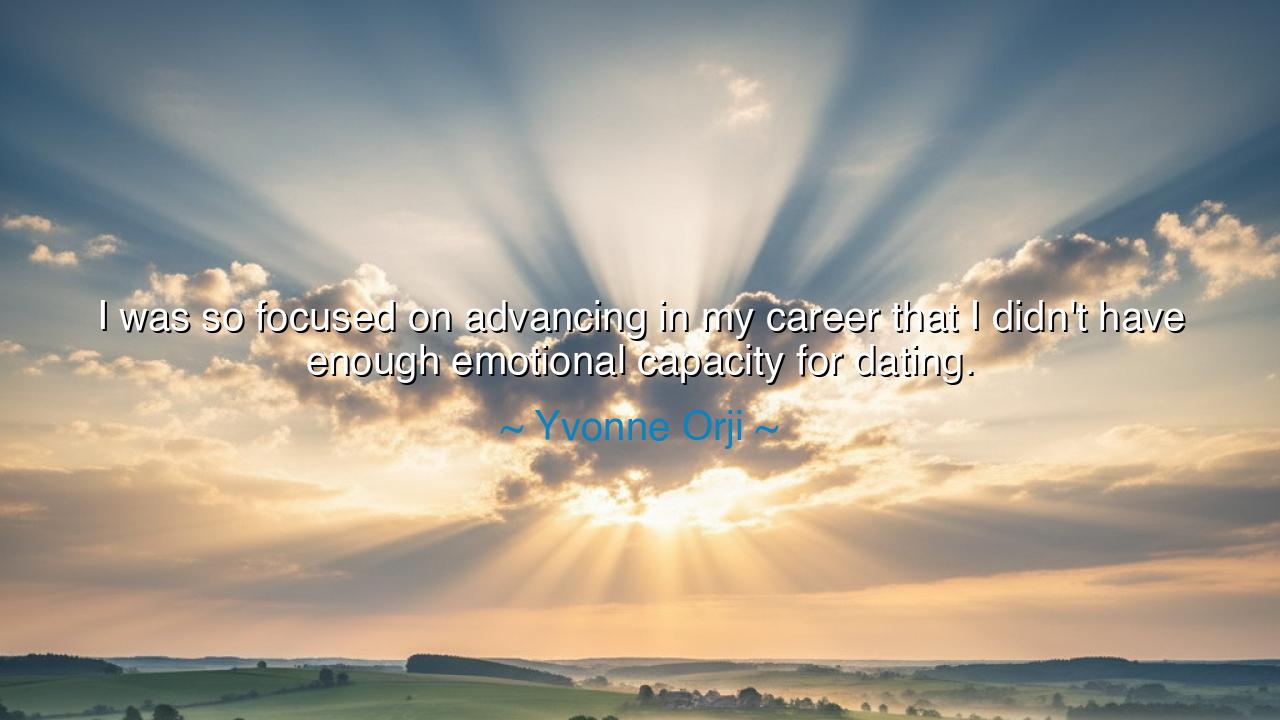
I was so focused on advancing in my career that I didn't have
I was so focused on advancing in my career that I didn't have enough emotional capacity for dating.






In a voice both candid and consecrated, Yvonne Orji confesses: “I was so focused on advancing in my career that I didn’t have enough emotional capacity for dating.” Hear the iron and the ache. She names a season when the spirit yoked itself to a single furrow—work—and found there was not enough water left for the tender field of love. This is no apology; it is a clear bell: attention is a currency, and we can spend it only once. When the day’s fire is given to one altar, the night finds less oil in its lamps.
Mark each stone in her sentence. Focused—the holy narrowing by which mountains are climbed. Advancing—not drifting, but shouldering upward, step over breathless step. Career—the craft that asks for vows, proofs, and years. Emotional capacity—the deep cistern from which patience, curiosity, and play must be drawn. Dating—not a pastime, but the art of mutual revelation, which withers under leftovers. The meaning is stark: love does not thrive on crumbs; it requires a prepared table.
The origin of such a confession is a life lived under bright demands—stages, sets, summonses. Many are told they can carry all rivers in two hands; Orji speaks the older truth: every great yes carves a no in shadow. In the style of the ancients, this is the wisdom of measure. To give the dawn to your career is noble—if you also admit that dusk may not suffice for the long listening dating asks. The soul is not a machine; it is a garden. Soil tilled only for harvest grows hard where flowers should root.
A story to fasten flesh to the thought. A young surgeon—call her Amara—rose before the sun to chase mastery. Charts, rounds, exams: her weeks were a braid of urgency. When she attempted dating, she carried triage into dinner, scanning for efficiencies instead of souls. A friend asked a simple question: “Where do you keep the hours that tenderness needs?” Amara wept, then carved two small channels in a stone week—one afternoon for rest, one evening for unhurried company. Months later, love did not arrive as reward for hustle; it arrived as fruit from land finally watered. The point was not to abandon calling, but to admit emotional capacity is built like strength—by deliberate rest and chosen room.
History keeps a sterner mirror. Nikola Tesla—brilliant, blazing—held that invention required him to remain unmarred by romance; genius, he believed, demanded all. His engines turned; his house stayed empty. Not all must choose as he chose, yet his life warns: unrelenting focus can harden from virtue into prison if never examined. By contrast, Johann Sebastian Bach composed through fatherhood and grief, apportioning time with almost liturgical rigor. The lesson is not one fate, but one law: apportionment. Without it, either the career starves or the heart does.
From Yvonne Orji’s line, we learn a clean teaching: capacity is not discovered; it is cultivated. To say “I did not have emotional capacity” is not to doom oneself to aloneness; it is to take inventory, then build new shelves. The brave do not pretend to have endless room; they reallocate, or they bless a single-minded season and name it honestly. There is a time to sharpen the blade, and a time to set it down so hands can hold something softer without cutting it.
Practical rites for those who feel the same pull: (1) Keep a weekly audit of attention—three columns labeled career, rest, relationship; write actual hours, not hopes. (2) Create a minimum viable ritual for dating—one unhurried window (90–120 minutes), device-light, curiosity-heavy, protected like a rehearsal. (3) Train emotional capacity the way you train skill: deep sleep, Sabbath hours, therapy or spiritual direction, and friendships that teach you to receive. (4) Install boundaries around work—shut-down times, no-notification zones—so your best presence is not always spent before you arrive at love. (5) If your season truly belongs to advancing the career, say so without shame—and put a date on the season’s end; a vow without horizon becomes exile. Do these, and your days will stop stealing from your nights; your craft will remain bright, and your heart will have room to be generous without breaking.






AAdministratorAdministrator
Welcome, honored guests. Please leave a comment, we will respond soon